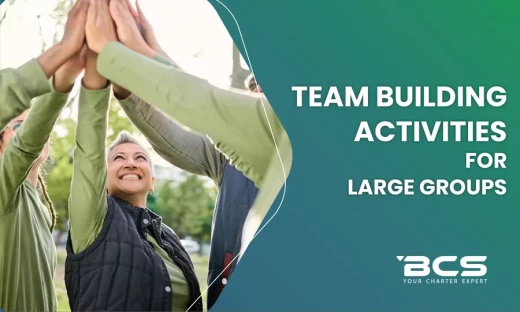Team Building Exercises for Big Groups: Fostering Collaboration and Fun


Team-building exercises play a major role in making the work environment cohesive and, as a result, productive. When done right, they not only break the ice among team members but also enhance communication, foster collaboration, and boost morale. For big groups, the challenge lies in finding activities that are inclusive, engaging, and effective so everyone can participate.
In this article, we are going to explore a variety of team-building events for large groups that are perfect, ensuring everyone gets involved and has a great time. We hope you enjoy the reading!

Why are team building exercises important?
While competitive salaries, flexible hours, and attractive benefits are definitely important, they are not everything we need. We go to the workplace day after day, use the office’s facilities, and interact with coworkers. We can use whatever makes office life easy and, if possible, fun. That is where initiatives such as team building for big groups come to rescue when properly applied.
Their main effect is to “break the ice” between coworkers. They pave the way for forming new connections which may go from a simple greeting every morning to strong collaborations and even lasting friendships that extend beyond the workplace. Professionals often agree that such connections are what really make work life bearable in the long run, especially in tough fields.
If you want to be more specific, we can list some objective benefits your team can obtain when it engages in such activities. You are going to agree on how important and productive they are.
New hires join in more naturally
Teaching how to operate the company’s software is not enough. We have to introduce the new hires to the team, and the best way to do that is by using team building activities. As previously mentioned, they can break the ice in a fun and casual way and make onboarding more natural.
People open up in the workplace
Large team building activities always encourage people to communicate. They have to develop their skills in order to convey their message and hear what others have to say. It is particularly important for professionals who have a history of dealing with communication barriers at work.
The whole team becomes stronger
This is a great opportunity to make employees feel seen. It can be done by granting prizes to the winners or by simply mentioning their names in a heartfelt way. When an employee feels seen by coworkers and managers, they naturally become more invested in everything about the job.
Stronger trust within the team
People tend to play a character at work, enforcing traits that are not really part of who they are. Team building exercises are a great way to break all that. Coworkers can see who one another is without any masks. That is the first step to build trust and have them truly operate as a team.
The workplace can foster creativity
Those activities encourage people to think out of the box. They learn to associate creativity with the workplace, which is particularly important for people who think they are stagnated. People can give a new look at their routine activities, which may end up boosting productivity as well.
Enhanced Communication Skills
When team-building exercises are implemented, they can improve communication within the team. They often require members to work together towards a common goal, which necessitates clear, effective communication. The team learns to express their ideas more clearly and listen actively to others, which makes everyone more productive.

Best team building exercises to try
Now that you know the basics about team building activities for large teams, we can delve into examples to try with yours! Here, we are going to divide them into main categories so you can pick them more easily. Then, each category ends with a few objective recommendations which you may try at the next opportunity. We are sure that the team is going to enjoy those activities!
Outdoor adventure challenges
They provide ample space for everyone to participate. Activities like obstacle courses, treasure hunts, and relay races encourage teamwork, strategic thinking, and physical fitness. Obstacle courses, for example, can include different stations where teams must complete tasks before moving on. It fosters collaboration and allows the workers to showcase their unique strengths.
Divide the group into teams and give each one a list of items to find or tasks to complete within a given time frame. The only way to win is by working together.
Divide the group into teams and give each one a list of items to find or tasks to complete within a given time frame. The only way to win is by working together.
Group activities with a theme
Themes add a layer of fun and creativity to these exercises. Consider costume contests, trivia nights, or murder mystery games. Themed events allow participants to immerse themselves in a new environment, encouraging them to think outside the box. They usually require people to interpret clues and identify the culprit together, fostering critical thinking and communication.
Lighthearted questions about the group’s habits and preferences can be a great way to welcome a new hire. Preferred A/C temperatures, coffee brands, and so on.
Each person writes something interesting they have done. They shuffle their notes, and each person picks one to try and guess who is more likely to have done that.
Charity-oriented activities
Giving back to the community can be a great way to bring a group together. Organize an activity where teams assemble care packages, build bikes for children, or volunteer at a local shelter. They not only promote teamwork but also provide a sense of purpose and fulfillment. Knowing that their efforts are making a positive impact will boost team morale and strengthen bonds.
There are many runs scheduled throughout the year, most of them for charitable causes. The team could participate together to make a positive impact.
If someone from your team already volunteers at a shelter or any other initiative, you could encourage the rest of the team to join them at least for a day.
Interactive training activities
They are very effective when focusing on relevant skills and topics. You can add a professional facilitator to conduct courses on leadership, communication, or conflict resolution. Interactive elements like role-playing, group discussions, and hands-on activities ensure that participants stay engaged and actively participate. These sessions provide valuable insights to use at work.
Teams must create a mock supply chain using limited resources. They must transport small objects through a course without touching any of the obstacles.
Teams are given a simple device and challenged to disassemble and reassemble it. The main goal is to get a comprehensive understanding of the item.
Sports and recreational Activities
Excellent for fostering teamwork and healthy competition. Organize a sports day with activities such as soccer, volleyball, or tug-of-war. They encourage physical activity, coordination, and team spirit. For a more relaxed approach, consider recreational ones like bowling, mini-golf, or charades. The key is to cater to different interests and skill levels, so everyone can participate.
Since there are many restaurants with bowling alleys, this is one of the easiest activities to plan with the whole team. They can enjoy a casual night while socializing.
This is a great indoor alternative which can even be played at the office. It fosters friendly competition in the team while bringing back their childhood memories.
Creative collaboration projects
Encourage creativity and innovation by projects that allow members to showcase their talents. Activities such as art challenges, cooking classes, or building projects can be highly engaging and rewarding. For example, a group cooking class where teams must prepare a meal together to be enjoyed by everyone may foster collaboration, communication, and time management.
Form pairs named as food pairings, with each person having the name taped to their back. The others have to guess the names by asking yes or no questions.
Pick a random office item. In 15 minutes, the group must found a company to promote that item to the rest of the team. It must include a name, a logo and a motto.
Problem-solving challenges
They are an excellent way to engage groups and encourage critical thinking. Activities such as escape rooms, puzzle competitions, or strategy games require teams to work together to solve problems within a set time frame. They promote collaboration, communication, and analytical thinking as team members pool their skills and knowledge in order to achieve a common goal.
Groups are given a set of random items to build a bridge. In the end, it must accomplish a specific goal such as bearing the weight of a toy car passing on it.
A moderator tells a movie plot, and groups have to guess the title. You can modify the topic to artist biographies, for example, depending on the team’s skill levels.

Virtual team building activities
Now that Zoom, Google Meets and similar tools are easily available, we recommend you adapt your large group team building activities to them. This way, you can include even more team members, such as remote workers and people who just could not go to the office on that day. In some cases, that can also be a very simple and easy way to accommodate special needs.
Conclusion
Team-building exercises are great to foster collaboration, enhance communication, and boost morale in large groups. The key to success is picking activities that are inclusive, engaging, and aligned with the team's objectives. Whether it is an outdoor challenge, a themed event, or any other activity, they allow the organization to create a positive and cohesive work environment.



